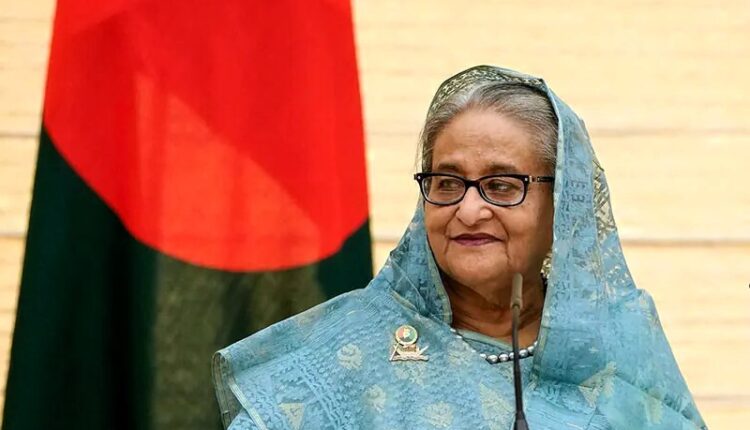
Sheikh Hasina shows no signs of remorse
Ousted leader Sheikh Hasina shows no remorse in interviews from her exile in India, blaming others for the crisis.
Sheikh Hasina – (Special Correspondent / Web Desk) – Bangladesh’s ousted premier, Sheikh Hasina’s written interviews flaunt an utter lack of contrition. There is not a hint of remorse, not a sliver of guilt.
The interviews published by Indian outlets last week — The Hindustan Times, New Indian Express and The Hindu — or the ones by Reuters, AFP and the UK’s Independent (published on October 29) show that former prime minister, in exile in India since August 5, 2024, remains thoroughly unencumbered by even a touch of introspection or self-doubt.
Going a step further, The Week, also based in India, published a column by Hasina where she deplores the ineptitude of the very institutions her regime had meticulously destroyed. She flails against the interim government for not having the people’s mandate, which she had manufactured to stay in power for years through rigged elections. She berates the BNP for trying to manipulate the caretaker government system, which her regime had abolished. Her deluded sense of being wronged pervades the entire article.
In the piece, Hasina comes closest to admitting a mistake made by her administration, something she has already addressed in written interviews. She writes, “I lament the lives of all Bangladeshis who have been needlessly killed since the protests in the summer of 2024. While the vast majority of law enforcement officials followed the rules, some members of the security forces plainly made mistakes in how they responded to the sudden increase in violence.”
Hasina goes on to write that it was a very fluid and “febrile situation”, and clearly there were “breakdowns of discipline within the chain of command”.
She then states, “However, the Awami League categorically rejects the allegations that we were directly responsible for, or commanded the use of, lethal force against our own citizens. To characterise what happened as a plot by a democratically elected government to commit violence against its own people is entirely wrong. Indeed, I personally took steps to ensure that no firearms were used.”
Pakistan, Saudi Arabia finalise Hajj 2026 arrangements
Throughout all her interviews Hasina maintains that the evidence against her, audio clips of phone calls, were either doctored or taken out of context. She also rejects the UN human rights office estimate that 1,400 people were killed during the July uprising as “inflated”.
She told in her interview with The Hindustan Times rejecting her role in the crackdown, “But to suggest that I was directing minute-by-minute tactical responses from the prime minister’s office is to fundamentally misunderstand how security forces work. I repeat, at no point did I authorise security forces to fire on crowds.”
The Daily Star’s own investigation found Hasina to have personally authorised the use of lethal weapons. This newspaper had reported on a phone recording from July 18, 2024 where Hasina tells her nephew, former Dhaka South Mayor Sheikh Fazle Noor Taposh, “I have given instructions, now I have given direct instructions; now they will use lethal weapons. Wherever they find them [protesters], they will shoot directly.”
The 78-year-old former leader used the occasion to express her thanks to India for providing refuge. “I am deeply grateful to the Indian people for providing me with a safe haven,” she told the crowd. “Our two countries have extensive and enduring ties. We are proud to be India’s trusty partner.”
Pakistan Leaders Pay Tribute to Allama Iqbal on His Birth Anniversary
While her interviews with the international agencies and the UK newspaper appeared to be somewhat balanced, the ones carried by the Indian outlets are far more incendiary. Sheikh Hasina’s lack of self-reproach aside, the latest round of interviews shirks from providing any context that explain Hasina’s hasty departure. There is little that sheds light on the weeks of untold violence preceding her flight. There is hardly any mention of Hasina’s 17 years of misrule when Bangladesh descended into an autocracy.
Her interviews and the writeup attempts to portray the Yunus-led government as a usurper without any acknowledgement of how the Awami League regime had fuelled discontent among the protesters as well as the general populace. The underlying message has been the next election will not be inclusive without the Awami League, whose activities are currently banned, taking part.
These interviews and column could not have been published without the knowledge or agreement of Hasina’s host country. Together with the former premier’s write-up, this move can only be interpreted as an attempt to influence the upcoming election. Hasina is still held accountable for hundreds of fatalities and thousands of injuries during the July rebellion alone. She would do well to remember that such interviews would not help to rebuild the Awami League’s image. Her hosts would do well to remember that, given the current circumstances, they should avoid engaging in activities that may isolate them from the people of Bangladesh.



Comments are closed, but trackbacks and pingbacks are open.